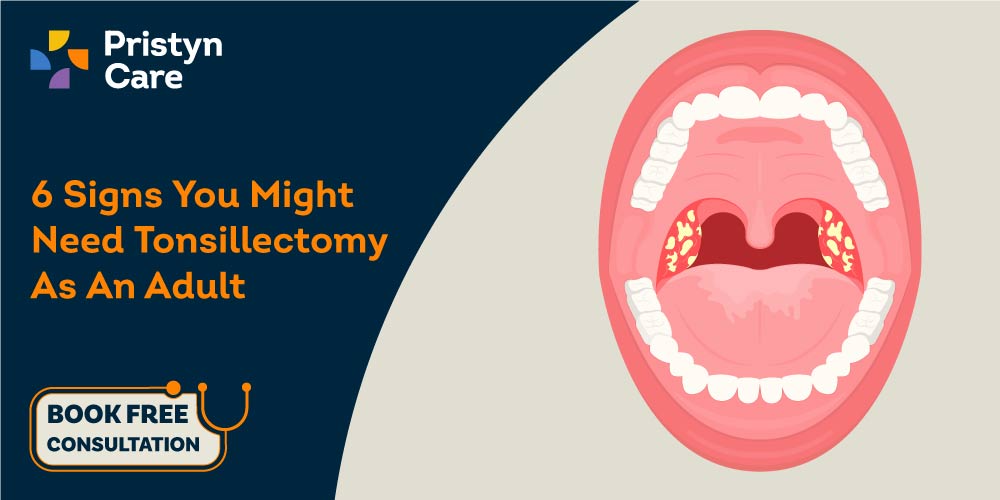6 Signs You Need a Tonsillectomy as an Adult

Tonsillitis is widely considered a “childhood disease”. However, it is not uncommon in adults as well. Today, tonsillitis has become very common in adults due to increased pollution, poor lifestyle habits, and more. Tonsil removal surgery may even be considered necessary.
What is a tonsillectomy and when is it done?
Tonsils are pads of immune tissue that act as a defense against bacteria and viruses that enter your mouth. They are more vulnerable to infection and inflammation because they act as a “first line of defense”. tonsillitisThey typically make up a large part of a child’s immune system, but they shrink in size as they age.
For most people, a sore throat is the most common indicator of tonsillitis, but the most common infections behind tonsillitis are strep throat, influenza, Mono (Epstein-Barr virus), etc. is. However, surgical intervention may be required for palliation. Here are some examples of when a tonsillectomy may be needed:
Tonsillectomy is considered necessary in adults if:
-
certain throat infections
Patients with recurrent tonsillitis should be considered for tonsillitis. Patients with about 7 tonsillitis episodes per year, he more than 5 episodes per year in the last 2 years, or about 3 episodes per year in the last 3 years, for long-term relief You should consider having a tonsillectomy.
Obstructive sleep apnea is a common side effect of untreated tonsillitis. Enlarged tonsils block the airways and make breathing difficult. Long-term sleep apnea can lead to mental fatigue, snoring, nightmares, high blood pressure, and more. If you have chronic insomnia or sleep problems due to tonsillitis, you should consider a tonsillectomy.
-
Related infections/complications of tonsillitis
Often untreated tonsil infections can lead to infection of the surrounding tissues, leading to health problems such as ear infections, sinusitis, and adenoiditis.
Halitosis and halitosis are often caused by the accumulation of food debris in the tonsil fissures of enlarged tonsil tissue. cannot be treated without removal of the tonsils.
Tonsil growths are often benign and result from infection, but some viruses, such as the human papillomavirus (HPV), can cause cancerous growths in the tonsils. Cancer No drugs can be used to eliminate the growth of cysts, and tonsillectomy is the most recommended procedure in such cases.
-
Decreased quality of life
Adult tonsillectomy is the most recommended treatment, even in acute cases, when quality of life is severely affected. Tonsil infections can make it difficult for patients to eat, breathe, and sleep, and directly affect their daily lives. You can have a tonsillectomy for quick relief, even if it is acute.
If you suffer from any of the above problems, or if you suffer from symptoms of tonsillitis, such as pain or bleeding from your tonsils, or difficulty swallowing, immediately consult a nearby professional otolaryngologist. Please get medical attention.
read: The Complete Guide to Tonsillectomy
How is an adult tonsillectomy performed?
The tonsillectomy procedure is the same for adults and children. The entire procedure takes approximately 30-45 minutes. The patient is anesthetized and transferred to the operating room. General anesthesia is generally used to avoid surgical trauma and complications, but local anesthesia may be used in some cases.
A steel blade or coblator is used to excise the tonsils based on patient and physician preference. Following this, the patient is transferred to the recovery ward for observation. Most patients make a full recovery within a few weeks and have no long-term complications or sequelae of surgery. If patients experience pain or discomfort during recovery, they are managed with over-the-counter pain relievers, anti-inflammatory drugs, and antibiotics.
What precautions should adults maintain to prevent tonsillitis?
If you are prone to tonsillitis, you should follow these precautions to prevent tonsil infections.
- Avoid contact with patients with infections such as sinusitis, tonsillitis. Do not share utensils while eating or drinking.
- Wash your hands with soap before and after eating, especially if you are around someone with an infection.
- Wear a face mask when you go outside. Cover your mouth and nose when coughing or sneezing and seek appropriate medical attention immediately.
If you think you have a tonsil infection, you should immediately consult an otolaryngologist for proper treatment, as delaying treatment can lead to unforeseen complications. Pristyn Care’s ear, nose and throat specialists are available for specialist tonsillitis care. Book now.
https://www.pristyncare.com/blog/6-signs-you-might-need-a-tonsillectomy-as-an-adult/ 6 Signs You Need a Tonsillectomy as an Adult




